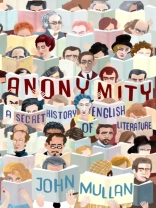Some of the greatest works in English literature were first published without their authors’ names. Why did so many authors want to be anonymous–and what was it like to read their books without knowing for certain who had written them? In Anonymity, John Mullan gives a fascinating and original history of hidden identity in English literature. From the sixteenth century to today, he explores how the disguises of writers were first used and eventually penetrated, how anonymity teased readers and bamboozled critics–and how, when book reviews were also anonymous, reviewers played tricks of their own in return.
Today we have forgotten that the first readers of Gulliver’s Travels and Sense and Sensibility had to guess who their authors might be, and that writers like Sir Walter Scott and Charlotte Brontë went to elaborate lengths to keep secret their authorship of the best-selling books of their times. But, in fact, anonymity is everywhere in English literature. Spenser, Donne, Marvell, Defoe, Swift, Fanny Burney, Austen, Byron, Thackeray, Lewis Carroll, Tennyson, George Eliot, Sylvia Plath, and Doris Lessing–all hid their names. With great lucidity and wit, Anonymity tells the stories of these and many other writers, providing a fast-paced, entertaining, and informative tour through the history of English literature.
O autorze
John Mullan is professor of English at University College London and the author of
How Novels Work. A broadcaster and journalist as well as an academic, he has been described as having 'a scholar’s knowledge worn with a journalist’s lightness of touch.’ He writes a weekly column on contemporary fiction for the
Guardian newspaper.












